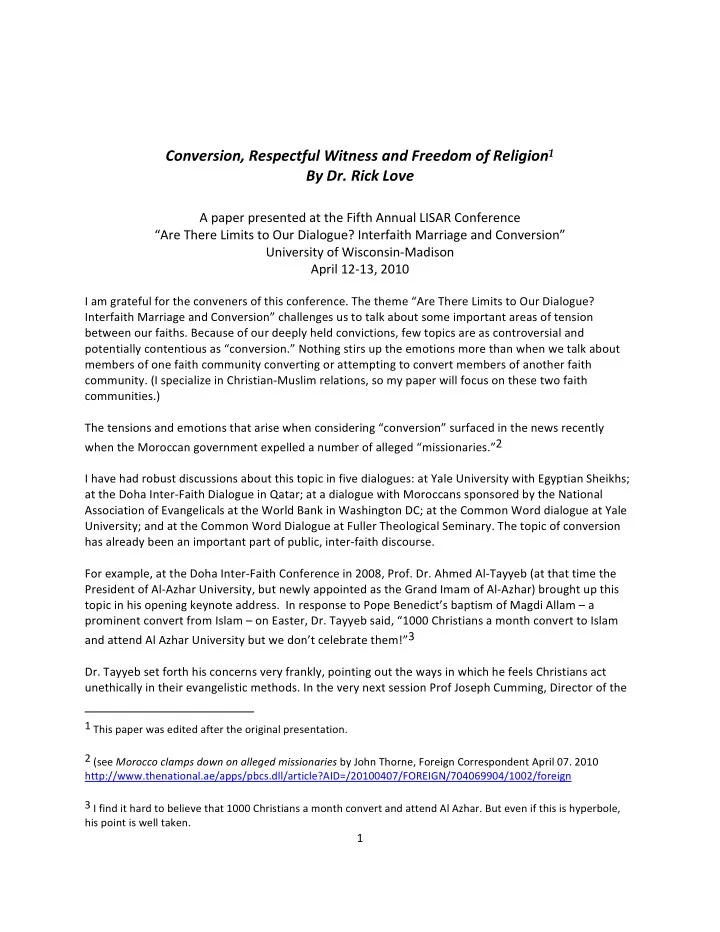

Conversion, Respectful Witness and Freedom of Religion 1 By Dr. Rick Love A paper presented at the Fifth Annual LISAR Conference “Are There Limits to Our Dialogue? Interfaith Marriage and Conversion” University of Wisconsin‐Madison April 12‐13, 2010 I am grateful for the conveners of this conference. The theme “Are There Limits to Our Dialogue? Interfaith Marriage and Conversion” challenges us to talk about some important areas of tension between our faiths. Because of our deeply held convictions, few topics are as controversial and potentially contentious as “conversion.” Nothing stirs up the emotions more than when we talk about members of one faith community converting or attempting to convert members of another faith community. (I specialize in Christian‐Muslim relations, so my paper will focus on these two faith communities.) The tensions and emotions that arise when considering “conversion” surfaced in the news recently when the Moroccan government expelled a number of alleged “missionaries.”2 I have had robust discussions about this topic in five dialogues: at Yale University with Egyptian Sheikhs; at the Doha Inter‐Faith Dialogue in Qatar; at a dialogue with Moroccans sponsored by the National Association of Evangelicals at the World Bank in Washington DC; at the Common Word dialogue at Yale University; and at the Common Word Dialogue at Fuller Theological Seminary. The topic of conversion has already been an important part of public, inter‐faith discourse. For example, at the Doha Inter‐Faith Conference in 2008, Prof. Dr. Ahmed Al‐Tayyeb (at that time the President of Al‐Azhar University, but newly appointed as the Grand Imam of Al‐Azhar) brought up this topic in his opening keynote address. In response to Pope Benedict’s baptism of Magdi Allam – a prominent convert from Islam – on Easter, Dr. Tayyeb said, “1000 Christians a month convert to Islam and attend Al Azhar University but we don’t celebrate them!”3 Dr. Tayyeb set forth his concerns very frankly, pointing out the ways in which he feels Christians act unethically in their evangelistic methods. In the very next session Prof Joseph Cumming, Director of the 1 This paper was edited after the original presentation. 2 (see Morocco clamps down on alleged missionaries by John Thorne, Foreign Correspondent April 07. 2010 http://www.thenational.ae/apps/pbcs.dll/article?AID=/20100407/FOREIGN/704069904/1002/foreign 3 I find it hard to believe that 1000 Christians a month convert and attend Al Azhar. But even if this is hyperbole, his point is well taken. 1
Yale Reconciliation program, thanked Dr. Tayyeb for his frankness about this important topic and pointed out that genuine love must be expressed through respect for what is sacred to others and also through commitment to religious freedom. According to Cumming, when we conduct da’wah or evangelism in ways that are disrespectful of others or their beliefs, or when we deny religious freedom to others, then we fall short of that love. He suggested that if we could uphold these two principles – of respect and freedom – than we might find a sound basis for a common ethics of da’wah and of evangelism. Later at the same conference I was having a meal with Dr. Tayyeb, Joseph Cumming and Dr. Aisha Al‐ Manna’ie, Dean of Shariah and Islamic Studies College in Qatar (Dr. Manna’ie was a former student of Dr. Tayyeb at Al Azhar). During our conversation Dr. Tayyeb said that Muslims are not engaged in da‘wah like Christians. I said, “Come on, Dr. Tayyeb, you know they are!” Dr. Manna’ie turned to Dr. Tayyeb and exclaimed, “He is right!” Dr. Tayyeb smiled and concluded, “At Al Azhar Dr. Manna’ie was a disciple of mine. Now she has become a disciple of yours!” I helped facilitate a three‐hour closed‐door session on the topic of da’wah and evangelism during the Common Word Dialogue at Yale University in July 2008. Almost thirty Christian and Muslim leaders participated. You can imagine how lively that discussion was! During this session Dr. Joseph Lumbard (an American Christian convert to Islam) exclaimed, “I didn’t realize that evangelism was one of the pillars of the Christian faith!” A few other Muslim leaders made the same comment to me during the Common Word Dialogue. I was surprised that Dr. Lumbard and these other Muslim leaders didn’t know that evangelism is a pillar of my faith as a Christian. Perhaps some of you here also do not know this. So here is a brief summary. Five Pillars of Evangelical Faith 4 The word “evangelical” comes from the word used to translate “gospel” in the New Testament, euaggelion , which literally means “good news.” One of the clearest summaries of the five pillars of evangelical faith can be found in Jesus words in Luke 24:44‐47.5 4 The following two definitions provide fairly typical summaries of evangelical belief. The British historian David Bebbington argues that Evangelicalism centers around four truths: “conversionism (an emphasis on the ‘new birth’ as a life‐changing experience of God), biblicism (a reliance on the Bible as ultimate religious authority), activism (a concern for sharing the faith) and crucicentrism (a focus on Christ’s redeeming work on the cross, usually pictured as the only way of salvation)” (Noll 1999:13). According to Alister McGrath, Evangelicalism is grounded in a cluster of six controlling convictions: 1. The supreme authority of Scripture as a source of knowledge of God and a guide to Christian living. 2.The majesty of Jesus Christ, both as incarnate God and Lord and as the Savior of sinful humanity. 3. The lordship of the Holy Spirit. 4. The need for personal conversion. 5. The priority of evangelism for both individual Christians and the church as a whole. The importance of the Christian community for spiritual nourishment, fellowship and growth (1994:55‐56). 5 In my original presentation I used 1 Corinthians 15:1‐4 and Matthew 28:18‐20 as the basis for the five pillars. 2
Recommend
More recommend